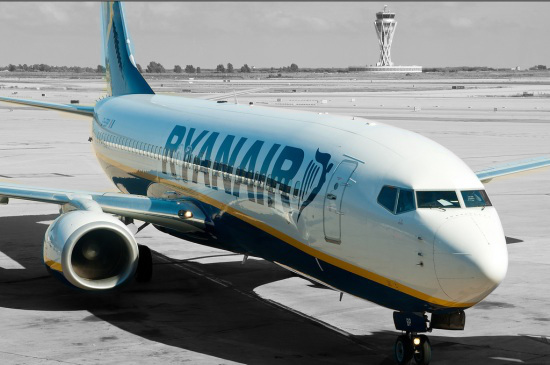Going on holiday can be a stressful experience at the best of times. Packing, arranging transport to the airport and the seemingly endless wait in a building called, unsympathetically, a terminal, can all add up to put even the most confident flyer on earth a little on edge. Once getting on the aeroplane, however, all of this stress can be allowed to melt away as you anticipate a relaxing stay in the foreign country of your choice.

Unfortunately, commercial airline Ryanair has caused a great deal of stress to some passengers recently, after three of their aircraft were forced to make emergency “Mayday” landings in Spain after coming dangerously close to running out of fuel.
One of the planes affected by the fuel shortages on board was flying from Stansted Airport to Spanish capital city Madrid. As with the other two flights, whose crew were also forced to make Mayday calls due to lack of fuel, the aeroplane was diverted to Valencia because poor weather conditions in Madrid made the landing too dangerous for a passenger carrier.
The Irish Aviation Authority Report into the incident, which occurred on July 26th of this year, said; “All three aircraft declared an Emergency (Mayday) when the calculated useable fuel on landing at Valencia was less than the final reserve.”
Should the planes have been allowed to land at Madrid Airport, rather than having had to continue on to the Valencia commercial property, there would have been no issue, as watchdogs from the IAA accept that all three planes left their initial airports “with fuel in excess of Flight plan requirements”. In other words, all three planes had been fuelled sufficiently to make it to Madrid, even allowing for delays in the flight whereby aeroplanes must circle in the airspace above the airport before coming in to land.
Additionally, the IAA accepted that no rules were broken by the airline as all three Boeing 737-800 aircraft were carrying “in excess of the minimum diversion fuel” required to be provided by all commercial airlines. This rule was set down so, in cases like this, aeroplanes can make it to a nearby airport for a safe landing should there be issues at the intended destination.
Despite Ryanair being cleared of any rule breaking, Spanish pilot union leaders have accused the airline of “operating on the very limits of legality” when it comes to the way they fuel their aircraft.
Even the IAA admits that; “Diverting with fuel close to the minimum diversion fuel in the circumstances presented on the evening in question was likely to present challenges to the crew.”
As a result of the incident on July 26th, and the claims of unsafe practise in Ryanair operations by the Spanish pilot union leaders, the report was commissioned in order to investigate the airline’s emergency procedures and set down recommendations for improvements which could be made in the future.
Additionally, Spanish and Irish aviation authorities met in Dublin last week to discuss issues raised by Spanish authorities. This was following comments made by the Spanish regarding incidents in their airspace which involved Ryanair aeroplanes. However, the Irish and Spanish Transport Ministries later released a joint statement announcing that Ryanair’s safety standards met regulations set down by the European Union.
In the report, the IAA cited several improvements that Michael O’Leary, boss of Europe’s largest commercial airline, may wish to implement in the future.
It said that Ryanair should “review fuel policy and consider issuing guidance to Crew with respect to fuel when operating into busy airports with mixed aircraft operations and types, particularly in poor weather conditions when diversions are likely.”
It also stated that pilot training for the commercial airline should include scenarios to prepare crew members for emergency landing situations, putting an emphasis on diversion management.
However, the report also points the finger at aviation authorities, as it was not only Ryanair crew members that were forced to issue Mayday calls as a result of the poor weather in Madrid that day. In fact, the diverted Stansted flight followed in an Easyjet passenger carrier and a Lan-Chile A340, forced to make emergency landings due to the same fuelling issue suffered by the Ryanair planes.
As a result, the IAA report also recommends that the authorities should “review delays into Madrid to consider if additional fuel should be recommended or required to be carried in normal operations.”
Mr O’Leary, who is currently in Madrid, was clearly keen to highlight that his airline had been cleared of any improper practise accusations.
In a statement released after the report was made public, he said; “We welcome this official report into the Valencia procedures on the 26th July last which confirms that all three Ryanair aircraft carried extra fuel and that all three complied fully with EU Ops procedures.
“We also welcome this week’s joint statement of the Irish and Spanish Transport Ministries which confirms that Ryanair’s safety standards are on a par with the safest airlines in Europe.”
Do you believe that airlines should be more prepared for eventualities such as this, and therefore should have to keep excess fuel on board in case of emergencies? Or do you think that Ryanair were completely innocent in this case, and that it was air traffic controllers in Valencia who were at fault?